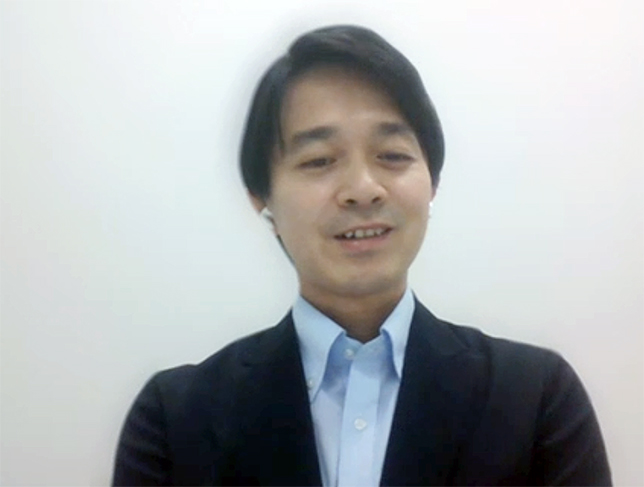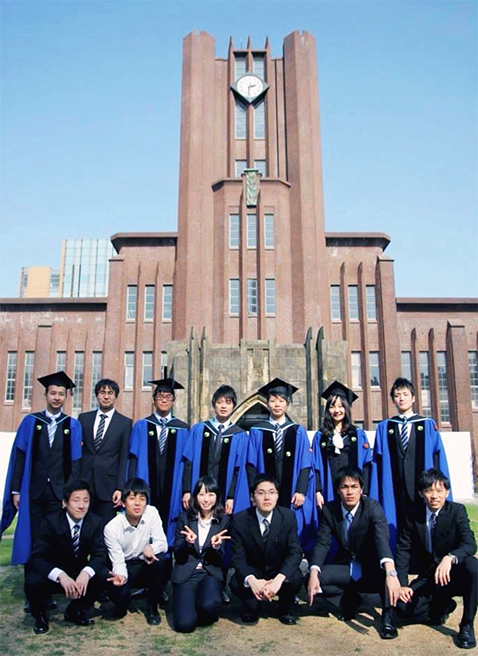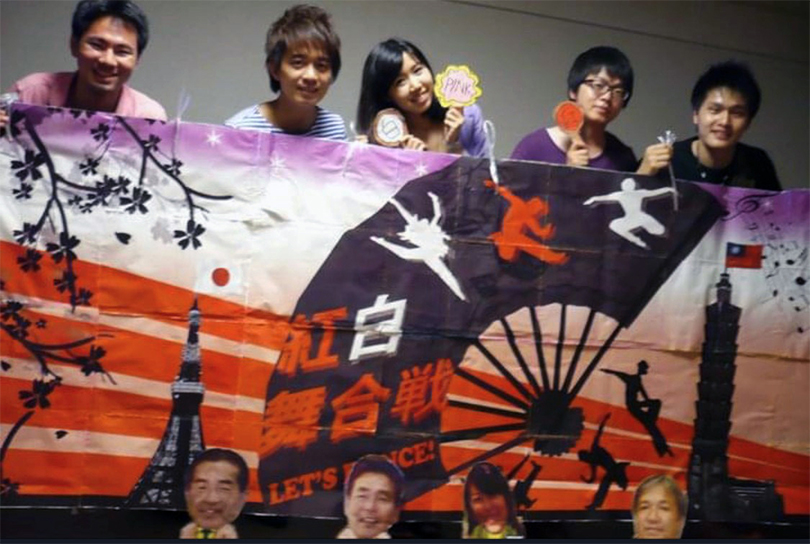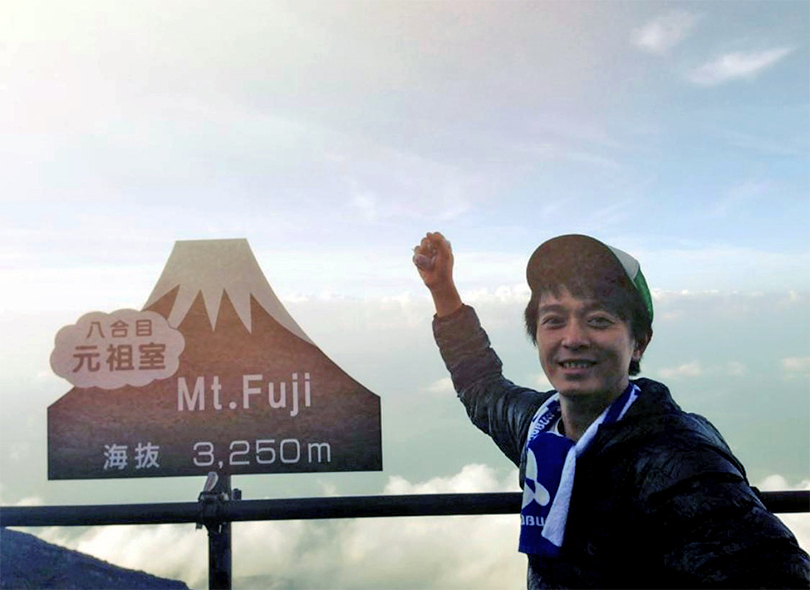The role of connecting dots to create path.
A turning point in life when he learned his strengths.
The role of connecting dots to create path.
A turning point in life when he learned his strengths.

Mr. Kuo took note of the high technological capabilities of Japanese companies. Currently, he works for a major material manufacturer in Japan.
Mr. Kuo took note of the high technological capabilities of Japanese companies. Currently, he works for a major material manufacturer in Japan.
○Mr. Kuo I-Jung (Taiwan)
Awarded in 2011 -> entered the University of Tokyo (Dept. of Chemical System Engineering, School of Engineering) -> currently employed by AGC Inc.
○Mr. Kuo I-Jung (Taiwan)
Awarded in 2011 -> entered the University of Tokyo (Dept. of Chemical System Engineering, School of Engineering) -> currently employed by AGC Inc.
Mr. Kuo I-Jung from Taiwan, who is featured in our third session, says that he did not originally planned to study in Japan. While studying chemical engineering at a university in Taiwan, he learned about Japan’s technological prowess and realized that he could study in Japan under the Panasonic Scholarship program. Through international exchanges between Taiwan and Japan, as well as himself and various scholars, he witnessed the importance of cross-cultural communication. He also took a view of his own strengths, role, and future through this process.
“Who I am now may have felt beyond my expectations during the scholarship period,” he reflects, then professes, “That is why my studies at the time were important.” We asked him why.
Mr. Kuo I-Jung from Taiwan, who is featured in our third session, says that he did not originally planned to study in Japan. While studying chemical engineering at a university in Taiwan, he learned about Japan’s technological prowess and realized that he could study in Japan under the Panasonic Scholarship program. Through international exchanges between Taiwan and Japan, as well as himself and various scholars, he witnessed the importance of cross-cultural communication. He also took a view of his own strengths, role, and future through this process.
“Who I am now may have felt beyond my expectations during the scholarship period,” he reflects, then professes, “That is why my studies at the time were important.” We asked him why.
Studying in Japan was never the plan
Studying in Japan was never the plan
Mr. Kuo was thinking about his future while he attended a university in Taiwan. Chemical engineering in which he majored at university was a basic field. In order to connect it to his future, he wanted to study and deepen his learning in this field as his specialty even after he was drafted for one year after graduation. He was also inspired by the students around him who were preparing to study in Europe and America. That was when the instructor of his seminar suggested, “Why don't you think about studying in Japan?” These were the words that dramatically changed Mr. Kuo’s life.
Mr. Kuo: Before then, I never thought about studying in Japan. The instructor was studying materials such as catalysts, and he knew well about the high level of Japanese technology in the materials field. I learned that Japan was one of the best in the world in both science and the development of practical materials. As soon as I developed an interest, I started to think that there might be an opportunity in Japan to carve out a future at the end of my studies, and I started collecting materials for studying in Japan.
He started studying Japanese in his fourth year at university, and made preparations during the year he was drafted and the next year working as a research assistant in a university laboratory. Ms. Chou Tsai-Hsuan, who appeared in the first session, was his college classmate. She was a friend who belonged to the same dance club as him. With the advice of Ms. Chou Tsai-Hsuan, who had started her study in Japan ahead of him, he was awarded the Panasonic Scholarship in 2011 and was able to study in Japan.
Mr. Kuo was thinking about his future while he attended a university in Taiwan. Chemical engineering in which he majored at university was a basic field. In order to connect it to his future, he wanted to study and deepen his learning in this field as his specialty even after he was drafted for one year after graduation. He was also inspired by the students around him who were preparing to study in Europe and America. That was when the instructor of his seminar suggested, “Why don't you think about studying in Japan?” These were the words that dramatically changed Mr. Kuo’s life.
Mr. Kuo: Before then, I never thought about studying in Japan. The instructor was studying materials such as catalysts, and he knew well about the high level of Japanese technology in the materials field. I learned that Japan was one of the best in the world in both science and the development of practical materials. As soon as I developed an interest, I started to think that there might be an opportunity in Japan to carve out a future at the end of my studies, and I started collecting materials for studying in Japan.
He started studying Japanese in his fourth year at university, and made preparations during the year he was drafted and the next year working as a research assistant in a university laboratory. Ms. Chou Tsai-Hsuan, who appeared in the first session, was his college classmate. She was a friend who belonged to the same dance club as him. With the advice of Ms. Chou Tsai-Hsuan, who had started her study in Japan ahead of him, he was awarded the Panasonic Scholarship in 2011 and was able to study in Japan.

After graduating from graduate school at the University of Tokyo, he joined a Japanese company. Mr. Kuo is fourth from the left in the back row. From here, various challenges began. Photograph: Courtesy of Mr. Kuo
After graduating from graduate school at the University of Tokyo, he joined a Japanese company. Mr. Kuo is fourth from the left in the back row. From here, various challenges began. Photograph: Courtesy of Mr. Kuo
Mr. Kuo: When I came to Japan, the first thing that impressed me was that many people actively talked to me, a foreign student. Actually, there were foreign students at the university in Taiwan, but I never tried to talk to them or actively communicate with them. I probably could not imagine myself having connections to overseas, as my future prospects at that time had me working in Taiwan. I felt that I had accomplished something by taking a step abroad, but I was very inspired by the ideas and values of the people I met while studying abroad, who actively and naturally tried to communicate with people from other cultures.
Mr. Kuo: When I came to Japan, the first thing that impressed me was that many people actively talked to me, a foreign student. Actually, there were foreign students at the university in Taiwan, but I never tried to talk to them or actively communicate with them. I probably could not imagine myself having connections to overseas, as my future prospects at that time had me working in Taiwan. I felt that I had accomplished something by taking a step abroad, but I was very inspired by the ideas and values of the people I met while studying abroad, who actively and naturally tried to communicate with people from other cultures.
Carrying out his original intention of “becoming a bridge between Japan and the world”
Carrying out his original intention of “becoming a bridge between Japan and the world”
When he first came to Japan, he had a hard time communicating, as he misread the nuances of the language, or misunderstood others due to differences in values, he says.
Mr. Kuo: However, the Japanese people around me kindly said, “Please feel free to say ‘I don’t understand’ and ask about the difference in ideas,” and tried to understand with interest saying, “I see. That’s how they think in Taiwan” even when their opinion differed from mine. At the same time, exchanges with the other scholarship students also changed my mindset. There was communication while respecting the different cultures among the people from all over Asia, including China, Hong Kong, Thailand, Vietnam and India. I strongly felt the importance and necessity of understanding each other’s differences and respecting each other’s values.
Mr. Kuo had difficulty deciding whether to continue his graduate studies and go on to a doctoral program, or find a job after finishing graduate school, but eventually he chose to find a job in Japan. Moreover, he started job hunting for a position in a Japanese company, not a foreign-affiliated company in Japan.
Mr. Kuo: I had written in the entry sheet for the Panasonic Scholarship about studying abroad, “I want to be a bridge between Japan and Taiwan, and between Japan and the rest of the world.” At the time I wrote it, I had not really imagined what I would do. However, the experience of my three-year scholarship gave me a clear picture of myself as a “bridge between Japan and the world.”
Mr. Kuo gradually came to understand that communication unique to Japanese society, which at first was puzzling to him, involved tacit understanding based on cultural rules and common values. He thought that by understanding from an outside perspective, rather than giving up on being able to understand because he was a foreigner, he may be able to smoothly coordinate transactions and cooperation between Japan and Taiwan or between Japan and other countries. He also says that it gave him the confidence that he could take on such a role.
When he first came to Japan, he had a hard time communicating, as he misread the nuances of the language, or misunderstood others due to differences in values, he says.
Mr. Kuo: However, the Japanese people around me kindly said, “Please feel free to say ‘I don’t understand’ and ask about the difference in ideas,” and tried to understand with interest saying, “I see. That’s how they think in Taiwan” even when their opinion differed from mine. At the same time, exchanges with the other scholarship students also changed my mindset. There was communication while respecting the different cultures among the people from all over Asia, including China, Hong Kong, Thailand, Vietnam and India. I strongly felt the importance and necessity of understanding each other’s differences and respecting each other’s values.
Mr. Kuo had difficulty deciding whether to continue his graduate studies and go on to a doctoral program, or find a job after finishing graduate school, but eventually he chose to find a job in Japan. Moreover, he started job hunting for a position in a Japanese company, not a foreign-affiliated company in Japan.
Mr. Kuo: I had written in the entry sheet for the Panasonic Scholarship about studying abroad, “I want to be a bridge between Japan and Taiwan, and between Japan and the rest of the world.” At the time I wrote it, I had not really imagined what I would do. However, the experience of my three-year scholarship gave me a clear picture of myself as a “bridge between Japan and the world.”
Mr. Kuo gradually came to understand that communication unique to Japanese society, which at first was puzzling to him, involved tacit understanding based on cultural rules and common values. He thought that by understanding from an outside perspective, rather than giving up on being able to understand because he was a foreigner, he may be able to smoothly coordinate transactions and cooperation between Japan and Taiwan or between Japan and other countries. He also says that it gave him the confidence that he could take on such a role.

Mr. Kuo (second from left) participating in a dance event, an activity in which he excels. He also made a banner by hand with his friends. Photograph: Courtesy of Mr. Kuo
Mr. Kuo (second from left) participating in a dance event, an activity in which he excels. He also made a banner by hand with his friends. Photograph: Courtesy of Mr. Kuo
Mr. Kuo: In the field of research, there were many people senior or junior to me who were good at research. To be honest, I considered myself not very good at doing research. However, my presentations on my research content were highly praised. Realizing that this was my strength was a big reason why I chose to get a job instead of going on to the doctoral program. In Japan, there are many techniques for producing wonderful materials, and there are craftsmen who support them. When a foreign company is looking for a technology for making a new product, I can tell them that we have something like this here through the use of my expertise. In addition, I can play a role in facilitating business communication between Japan and other countries, as well as transforming the differences between the two countries into understanding. It was because of my experience in studying abroad that I became aware of what I had in me.
Mr. Kuo: In the field of research, there were many people senior or junior to me who were good at research. To be honest, I considered myself not very good at doing research. However, my presentations on my research content were highly praised. Realizing that this was my strength was a big reason why I chose to get a job instead of going on to the doctoral program. In Japan, there are many techniques for producing wonderful materials, and there are craftsmen who support them. When a foreign company is looking for a technology for making a new product, I can tell them that we have something like this here through the use of my expertise. In addition, I can play a role in facilitating business communication between Japan and other countries, as well as transforming the differences between the two countries into understanding. It was because of my experience in studying abroad that I became aware of what I had in me.

Taking on the challenge to climb Mt. Fuji, just because it is a waste not to when living in Japan. Photograph: Courtesy of Mr. Kuo
Taking on the challenge to climb Mt. Fuji, just because it is a waste not to when living in Japan. Photograph: Courtesy of Mr. Kuo
The importance of connecting people, which he learned from studying abroad
The importance of connecting people, which he learned from studying abroad
Person to person, product development to material technology, country to country. Mr. Kuo says that his role in connecting these dots into a path has given him something to live for, and look forward to in the future.
Mr. Kuo: I belong to the technical sales department but also work in the business development department at my company. My field of operation is sales. Although I do not manufacture things directly, I feel a sense of fulfillment as one of the team creating something for society.
In the same way that mobile phones that first appeared in the mid-1980s evolved into smartphones 30 years later and have a major impact on people’s lives, I want to be someone who was involved in the creation of an innovative product that everyone uses and takes for granted 30 years from now. To what extent I can demonstrate my strengths and increase my value over the next 30 years: I am grateful that I am accumulating such work and other experiences in Japan.
It would have been impossible for myself as a student in Taiwan to imagine what I would look like or what my environment would be like now, says Mr. Kuo. However, because of this, he is certain that one has to tackle what is in front of him solidly.
Mr. Kuo: My motto is “Do what is in front of you well.” For me as a university student in Taiwan, studying in Japan, getting a job in Japan, or my dreams for 30 years from now were all beyond my expectations. But when you study something, you face it head on and learn something. Doing that is a solid step forward. I think it is necessary to take a solid step forward if you have difficulty deciding your future, as the choices are always waiting for you at the end of the path. Participation in the Panasonic Scholarship Program was my first step. And it was a turning point in my life.
Person to person, product development to material technology, country to country. Mr. Kuo says that his role in connecting these dots into a path has given him something to live for, and look forward to in the future.
Mr. Kuo: I belong to the technical sales department but also work in the business development department at my company. My field of operation is sales. Although I do not manufacture things directly, I feel a sense of fulfillment as one of the team creating something for society.
In the same way that mobile phones that first appeared in the mid-1980s evolved into smartphones 30 years later and have a major impact on people’s lives, I want to be someone who was involved in the creation of an innovative product that everyone uses and takes for granted 30 years from now. To what extent I can demonstrate my strengths and increase my value over the next 30 years: I am grateful that I am accumulating such work and other experiences in Japan.
It would have been impossible for myself as a student in Taiwan to imagine what I would look like or what my environment would be like now, says Mr. Kuo. However, because of this, he is certain that one has to tackle what is in front of him solidly.
Mr. Kuo: My motto is “Do what is in front of you well.” For me as a university student in Taiwan, studying in Japan, getting a job in Japan, or my dreams for 30 years from now were all beyond my expectations. But when you study something, you face it head on and learn something. Doing that is a solid step forward. I think it is necessary to take a solid step forward if you have difficulty deciding your future, as the choices are always waiting for you at the end of the path. Participation in the Panasonic Scholarship Program was my first step. And it was a turning point in my life.


